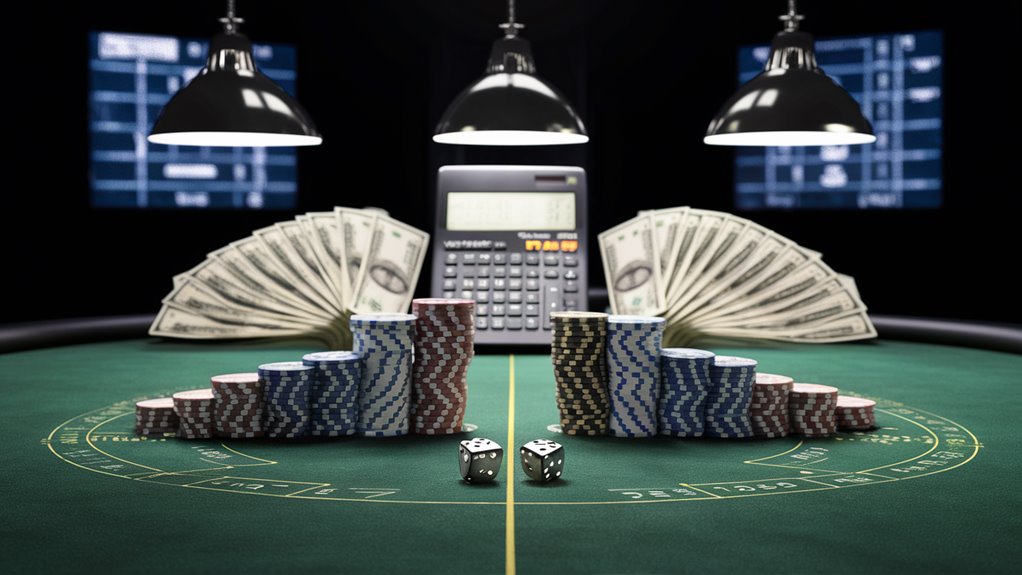Stay Away from These Common Gambling Errors: Simple Poker Tips

Key Poker Mistakes That Cut into Your Earnings
Winning at poker means you should not make big, bad errors that can wipe out your money. Knowing and stopping these key mistakes is 이 자료 참고하기 important for keeping your profits high and playing well at the tables.
Choosing When to Play and Which Hands
A major error is going in with too many weak hands. Good players often keep a sharp and bold style, choosing to play only 20% of the initial hands and being very picky early on. This careful way stops the loss of chips in unsure spots.
Keeping Your Cool and Handling Tilt
Making choices based on feelings during bad runs kills profits too. Using firm cut-off limits and tracking how well you play helps keep these feeling-based errors away. Pro players treat each game with cool, number-based thinking, not letting their feelings lead.
Smart Money Handling
Good money handling is the base for long-lasting poker wins. Players should:
- Keep enough cash ready for the stakes they play
- Track detailed game outcomes and numbers
- Stick strictly to set loss limits
- Adjust their stakes based on how their money changes
By seeing poker as a smart numbers game and following these steps, players can keep up their edge and cut down mistakes that bite into profits.
Playing Too Many Hands
Playing Too Many Hands in Poker: How It Kills Your Bankroll
The Risk of Playing Loose
Choosing starting hands well is key to keeping your poker money safe. In Texas Hold’em, the best way says to play about 20% of starting hands from early to middle spots. This sharp, bold approach keeps you ahead while avoiding losses.
Common Errors and Fixes
New players often wrongly play weak hands, hoping for unlikely wins.
This bad way drains money fast. Focus on strong cards and learn to fold weak hands right away.
Loose play makes hard situations after the flop, leading to costly mistakes and tough choices.
Raising Expected Gains
Every pot you join with not-so-good hands is a bad move in terms of value. Weak starting hands usually lead to:
- Losing chips in small pots
- Big losses when your hand is only second-best
- Hard choices after the flop
- Lower profits over time
Planning Your Strategy
Tight hand choice saves chips for when you have a strong edge. Patience and control set apart winning players from losers.
Instead of hoping to beat others after the flop with okay cards, wait for strong hands that really give you a chance to win. This careful way leads to steady wins over time at the poker table.
Not Caring About Position
The Big Effect of Position in Poker Plans
Getting Position Basics Right
Position in poker is a big tactical edge you can have.
Playing late gives important info about what others do, helping you make more money-making choices. This edge lets players pick better moves and get more value in each hand.
The Trouble with Playing Early
Playing from early positions (spots just left of the big bet) means big tactical problems. Players must move without knowing what others plan, often facing tough spots when there are raises and re-raises.
Weak hands are especially hard to make money from in early spots, needing tighter choice and more careful play.
Benefits of Playing Late
End seats like the button give the most freedom and chances to make money. These late spots let players:
- Watch what others do before they decide
- Play more starting hands with a chance of profit
- Better manage how big the pot gets
- Bluff more often and more successfully
- Keep an advantage after the flop
Bluffing Based on Position
How often you bluff should match up with how good your position is. Late spots allow for more successful bluffs thanks to better info and control over the pot.
On the other hand, playing early means you need stronger hands and must pick very carefully where you try to bluff, as you must act first later on without knowing what others will do.
Using Position Fully
Adding position thinking to each decision improves win rates a lot. Players should tweak how they start, how much they bet, and how they play after the flop based on their spot at the table.
This awareness of position helps avoid tough spots while raising chances for profit every game.
Chasing Losses Without Thinking
Know and Stop Loss Chasing in Gambling
The Mindset of Chasing Losses
Chasing losses is a very bad mental habit in gambling, ruining both your pile of money and long-term money safety.
This bad cycle usually starts when players think they are about to win or can get back losing money by betting more and more.
Signs and Risk Points
Going after losses often shows in several risky actions:
- Putting down double bets after losing a few times
- Leaving planned betting ways
- Making quick, feeling-led bets
- Using money meant for must-pay bills
- Gambling longer than you planned
How to Stop Loss Chasing Effectively
Set Firm Stop-Loss Limits
Decide on a max loss amount before you start gambling. This set limit is a must, making you stop the session when reached.
Keep Good Records
Track all your bets well, noting:
- How much each bet is
- Wins and losses
- How long each game session goes
- Total effect on your money
Pro-Level Discipline
Smart gamblers know that losing is part of the game. They keep tight control over their money and their emotions, no matter if they’re up or down short-term.
Safe Money Boundaries
Don’t touch money set aside for:
- Everyday costs
- Paying bills
- Emergency savings
- Family needs
These key money rules stop the awful cycle of rash loss chasing and keep gambling in check.
Poor Money Handling
Must-Knows for Managing Your Gambling Money

The Key to Gambling Wins
Handling your gambling money right is the main thing that separates long-time winners from those who fail.
Pro money plans mean treating your gambling cash like a careful business choice, needing good planning and solid control.
Setting Up Your Gambling Funds
Smart money setup starts with keeping gambling cash totally separate from daily living costs. Rule one: only gamble with money you can afford to lose.
Pro gamblers keep a minimum of 20-30 buy-ins for their betting level. For instance, $1/$2 poker players with $200 buy-ins need a $4,000-$6,000 basic gambling fund.
Avoiding Common Money Errors
Choosing Stakes and Managing Risk
Playing in fitting stakes stops the bad impact of overstretching. Playing with “scared money” – stakes too high for your comfort – leads to bad choices and possible ruin.
Smart stake changes mean willingly moving to lower levels to save your money during bad times.
Detailed Money Tracking
Full session tracking gives key insights like:
- How often you win
- Swings in results
- Basic money needs
- Protection during bad runs
Without good records, managing your money is impossible.
Winning at gambling fully relies on using clever money systems and sticking to strict money rules.
Letting Feelings Lead Choices
Mastering Your Emotions in Decision Making
The Big Role of Managing Feelings
Strong money handling won’t work if you can’t manage emotional changes during ups and downs.
Players often make bad choices when they feel emotionally shaken, especially during winning runs or efforts to win back losses.
Using Systematic Decision Plans
Setting Clear Rules
Having set stop-loss limits is key for thoughtful decision-making. A planned approach needs:
- Strict sticking to loss caps no matter the emotional state
- Defined winning goals to keep profits
- Regular use of exit plans
Spotting Warning Signs
Emotional signs often show through:
- Speedy decision-making
- More risk-taking
- Straying from proven strategies
Plans for Keeping Choices Strong
Checklist for Decision Quality
To keep decisions at the best level, check:
- If your money matches the current plan
- The numbers and logic behind choices
- Sticking to set plans
Steps for Emotional Recovery
When you see signs of emotion:
- Stop right away
- Look over your strategy
- Get your mind right before starting again
This planned way makes sure choices stay based in logic, not emotion, boosting chances for lasting success.
Not Studying Opponents
The Must-Know Importance of Watching Other Players in Gambling
Understanding How Players Act
Watching opponents is a very important yet often missed part of top gambling plans.
Many players mess up by only thinking about their own moves and not seeing the valuable clues from watching their rivals. This mistake can lead to big avoidable losses and lost chances for more money.
Building Smart Watching Skills
Tactical edges come from carefully following key signs from your rivals:
- How they betting and how much they change it
- How aggressive they are based on position
- Timing hints and how they act
- How they handle stress in tight spots
- How they do when winning or losing
Making Good Use of Analysis Ways
Winning in gambling needs building planned ways to watch opponents.
Start by focusing on one or two players to make strong watching skills. Keep track of and note specific moves across many games, making detailed notes of betting ways and choice patterns.
This planned way changes random watching into useful ideas.
Using Info for More Money
Smart info gathering makes for better guesses of rival moves and likely moves.
By keeping good mental notes on how rivals react to different game boards and betting moves, players can make smarter choices. This info is really valuable in big stakes games where right reads pick the best play.
Getting Better at Pattern Spotting
Building top pattern spotting skills lets players:
- Better guess rival card ranges
- Spot mental trends under pressure
- See good betting chances
- Adjust plans based on rival hints
- Make the most of behavior that doesn’t change
Mastering how you watch rivals changes gambling from a game of luck into a smart plan where watching and pattern spotting bring steady profits.
Giving Too Much Worth to Weak Draws
Learning the True Value of Draws in Gambling
The Risk of Valuing Weak Draws Too High
Weak draws are among the worst traps in gambling, mainly in poker and betting on sports.
Players often handle spots with some upsides badly, leading to big money losses through poor choice-making.
Poker Drawing Basics
Figuring Drawing Odds
When you face drawing choices in poker, using a planned way is key:
- Compare pot odds to drawing odds
- Look at likely odds based on stack sizes
- Think about how strong your hand is when complete
- Factor in likely pay from rivals
Usual Drawing Errors
Gutshot straight draws and similar weak hands need careful thought.
Key things to think about include:
- Your spot at the table
- How your stack compares to the pot
- What rivals usually do
- Other ways to win Expert Tips and Safe Gaming Practices
Betting on Sports: Edge Analysis
Least Profitable Edge
To make money long-term in sports betting, knowing the least edge needed is key:
- -110 lines need 52.4% win rate to break even
- Small edges (1-2%) are not enough
- Aim for at least a 5% edge to bet
- Think about the house edge in your numbers
Ways to Check Your Edge
Doing well in sports betting needs:
- Full stats analysis
- Clear number-based edge
- Strong money handling
- Smart timing and choosing of bets



